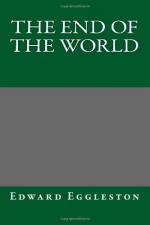“I do not talk much. But you have arrived at a critical point—a point of turning. Out of his own life, out of his own sorrow, the Backwoods Philosopher warns you. I am at peace now. But look at me. Do you not see the marks of the ravages of a great storm? A sort of a qualified happiness I have in philosophy. But what I might have been if the storm had not torn me to pieces in my youth—what I might have been, that I am not. I pray you never trust in a woman’s keeping the happiness of your life!”
[Illustration: “LOOK AT ME.”]
Here Andrew slipped his arm through Wehle’s, and began to promenade with him in the large apartment up and down an alley, dimly lighted by a candle, between solid phalanxes of books.
“I pray you give good heed,” he said, resuming. “I was always eccentric. People thought I was either a genius or fool. Perhaps I was much of both. But this is a digression. I did not pay any attention to women. I shunned them. I said that to be a great author and a philosophical thinker, one must not be a man of society. I never went to a wood-chopping, to an apple-peeling, to a corn-shucking, to a barn-raising, nor indeed to any of our rustic feasts. I suppose this piqued the vanity of the girls, and they set themselves to catch me. I suppose they thought that I would be a trophy worth boasting. I have noticed that hunters estimate game according to the difficulty of getting it. But this is a digression. Let us return.
“There came among us, at that time, Abigail Norman. She was pretty. I swear by all the sacred cats of Egypt, that she was beautiful. She was industrious. The best housekeeper in the state! She was high-strung. I liked her all the more for that. You see a man of imagination is apt to fall in love with a tragedy queen. But this is a digression. Let us return.
“She spread her toils in my path. While I was wandering through the woods writing poetry to birds and squirrels, Abby Norman was ambitious enough to hope to make me her slave, and she did. She read books that she thought I liked. She planned in various ways to seem to like what I liked, and yet she had sense enough to differ a little from me, and so make herself the more interesting. I think a man of real intellect never likes to have a man or woman agree with him entirely. But let us return.
“I loved Abigail desperately. No, I did not love Abigail Norman at all. I did not love her as she was, but I loved her as she seemed to my imagination to be. I think most lovers love an ideal that hovers in the air a little above the real recipient of their love. And I think we men of genius and imagination are apt to love something very different from the real person, which is unfortunate.
“But I am digressing again. To return: I wrote poetry to Abby. I courted her. I cut off my long hair for a woman, like Samson. I tried to dress more decently, and made myself ridiculous no doubt, for a man can not dress well unless he has a talent for it. And I never had a genius for beau-knots.




